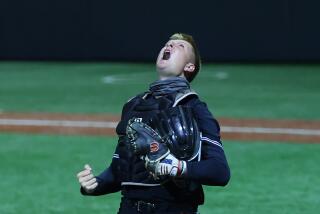15 From San Diego Among Those Cited : Latino Students Honored for Grades
- Share via
When a caller reaches the home of Javier Escobedo, 17, the television can be faintly heard in the background, tuned to a Spanish-language station. Although his family speaks only Spanish at home, Javier learned English after he arrived from Mexico as a scared eighth-grader.
“My first year I was taking English-as-a-second-language courses and my grades were really bad, mostly C’s and D’s,” he said.
But Javier enrolled in summer school to help him learn English. The hard work paid off: Javier graduated in the top 2% of his class this year at Clairemont High School. During high school he also ran on the varsity cross country and track teams and played varsity soccer. He plans to attend the University of California at San Diego to study engineering.
“My parents have always been very supportive. They wanted me to get good grades and are proud of me,” he said.
Javier was one of 253 “exceptional scholars” honored at a ceremony Saturday in Los Angeles and given by the Youth Opportunities Foundation, a nonprofit organization formed 20 years ago to encourage Latino students to attend college.
At a time when studies show that 45% of Latino high school students drop out before reaching the 10th grade, the success of the 253 top students deserves special attention, said Fernando Oaxaca, foundation chairman.
“Too often we hear that Hispanic kids have tremendous problems with poverty, dropouts, drugs,” he said. “Our kids have the ability to be winners, but nobody ever hears about them. This event is to stimulate the kids to know other kids like them.”
According to Oaxaca, the youngsters rank in the top 3% of their classes and were chosen from 184 high schools throughout the state. The average score on the Scholastic Aptitude Test is 1,105, 200 points higher than the national average. Nine are student body presidents, 46 are ranked first in their class, seven are valedictorians and one is a National Merit Scholar.
Forty-five were born in other countries, including Mexico, Colombia, El Salvador and Costa Rica, Oaxaca said, and more than half will be attending the University of California in the fall. Others have been accepted to Ivy League schools and such top-ranked West Coast institutions as Stanford.
Fifteen students were selected from the San Diego area, foundation Executive Director Felix Castro said. They will be sent letters telling them of their selection, he said.
Among those chosen from San Diego is Louis Alonso, who graduated Tuesdayfrom Hoover High School, Castro said. Student body president, he is ranked first in his class and was on the wrestling and baseball teams.
“I didn’t get much sleep, but it was worth it--I got into Stanford,” Louis said.
“I worked hard to see what I could do. I don’t like doing things halfway.”
Louis said he eventually would like to go to law school.
Twelve honorees--the largest number from any single school--came from Garfield High School in East Los Angeles.
Many of the students credited hard work and support from their parents for their success. But for some, the odds against success were high.
Jose Juarez immigrated to the United States from Mexico when he was a few days old. “In my family, no one has gone to college. I didn’t even know that much about it until I started talking to my counselors,” he said.
Jose graduated from Sweetwater Union High School in National City this month. He was ranked in the top 4% of his class and plans to attend the University of California at Berkeley where he will study engineering.
Vilma Martinez, chairman of the University of California Board of Regents, presented the young scholars present at the ceremony in Los Angeles with certificates recognizing their achievement. She referred to a time when “excellence was not enough” to get ahead.
“There was a time in this country when excellence was not enough to get you the opportunities and positions you deserve,” she said. “That is why we worked so hard to get what are called affirmative-action programs.
“I’m very proud of you. I know how hard it is to get here.”
More to Read
Sign up for Essential California
The most important California stories and recommendations in your inbox every morning.
You may occasionally receive promotional content from the Los Angeles Times.














